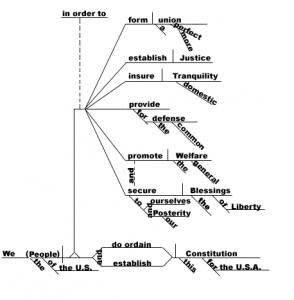
I was talking to a friend today about one-sentence poems I love.
By one-sentence poems I don’t mean very short poems like the one-line poems Michael McFee discussed in his Feb. 2008 article in the AWP Writer’s Chronicle. McFee has written a whole book made up of monostich (The Smallest Talk), and so he is likely much interested in the form and its function. That is an interesting line of inquiry (pardon the pun), but not what I’m talking about when I mention one-sentence poems here.
I’m talking about poems of a greater length that are only one sentence long. Not poems without punctuation, but poems that employ the standard rules of grammar and flow. When pulled off well, the simultaneity of loose constructions and rigid attention to details that a lengthy single-sentence poem requires puts me in mind of the most stirring music: what I receive appears spontaneous and wildly free even while I understand that it seems this way only because of careful practice and intense focus on the part of the maker.
Dissidence
in memoriam Thelonious Monk
You have to be able to hear past the pain, the obvious
minor-thirds and major-sevenths, the merely beautiful
ninths; you have to grow deaf to what you imagine
are the sounds of loneliness; you have to learn indifference
to static, and welcome noise like rain, acclimate
to another kind of silence; you have to be able to sleep
in the city, taxis and trucks careening through your dreams
and back again, hearing the whines and sirens and shrieks
as music; you must be a mathematician, a magician
of algebra, overtone and acoustics, mapping the splintered
intervals of time, tempo, harmony, stalking or sluicing blues
scales; you have to be unafraid of redundance, and aware
that dissonance-driven explorations of dissonance
may circle back to the crowded room of resolution;
you have to disagree with everything except the piano, black
and white keys marking the path you must climb step
by half-step with no compass but the blues, no company
but your distrust of the journey, of all that you hear, of arrival.
The play between different types of resistance to norms in this poem speaks to what I like about a good one-sentence poem. The poem resists the simple structures set up by the culture of grammar. Sure, Walton could have easily used periods in place of semi-colons, but phooey on the period, he was going to push his poem as far as he could. Long-sentence poems are dissenters, resisting the rule of law, the brevity we tend to desire of highly-communicative language. The effect of this dissent could play as a kind of dissonance upon a certain, rule-abiding ear. But the beauty of the best one-sentence poems is that they manage their dissidence largely unnoticed. The poems flow along, like imbedded soldiers of the resistance, following most of the rules that sentence is supposed to follow, so that the less observant reader might overlook rebellions against the full stop.
Every time I recognize the fact that a poem is executed using only one sentence, it takes my breath away. There is a lot to manage: the deployment of proper grammar, the pacing of the sentence and its thoughts, the ability to string the reader along without exasperating her, the deft control of subject, tense, case, number… These are sentences that make me think of my jr. high school English teacher, (Ms./Miss/Mrs.?) Nichols. M. Nichols was the last of a breed of English teachers who might have been married, partnered, spinsters for all we knew. We weren’t worried about her personal life, we were just worried she might go back in time a few years and use her ruler to whack us over the knuckles if we didn’t diagram our sentences correctly. That may sound as if I am disrespecting M. Nichols, but actually, I am quite glad my path crossed hers. I have an expanded capacity to love a well-wrought sentence thanks to her.
Steve Scafidi’s unhinged rant, “To Whoever Set My Truck on Fire,” became all the more compelling when I realized all eight cinquains create one long, wild sentence. John Keats’ “Bright star, would I were steadfast as thou art” feels all the more full of longing given that it is one long wistful sentence. And Carl Phillips’ “The Grackle” seems to hesitate mid-flight since the thirteen-stanza poem turns out to be an extended, grammatically-correct phrase, completed not with a period but a dash.
What about you, Harriet readers? Do you have any favorite one-sentence poems, 14 lines or longer?
I’ll end with one more, a poem that catches me up in the rapturous, lawless wanderings of a mind in love. From Adrienne Rich’s Twenty-One Love Poems:
XIII
The rules break like a thermometer,
quicksilver spills across the charted systems,
we’re out in a country that has no language
no laws, we’re chasing the raven and the wren
through gorges unexplored since dawn
whatever we do together is pure invention
the maps they gave us were out of date
by years … we’re driving through the desert
wondering if the water will hold out
the hallucinations turn to simple villages
the music on the radio comes clear—
neither Rosenkavalier nor Götterdämmerung
but a woman’s voice singing old songs
with new words, with a quiet bass, a flute
plucked and fingered by women outside the law.
Poet and editor Camille T. Dungy was born in Denver but moved often as her father, an academic physician...
Read Full Biography

